Reflective Learning Report: Group Project Analysis & Reflection
VerifiedAdded on 2020/11/12
|12
|3157
|255
Report
AI Summary
This report provides a reflective analysis of a group project, delving into the application of various learning models. The introduction sets the stage by defining learning and the importance of reflective practice, emphasizing the use of the Kolb and ORID models for critical thinking and the Gibbs reflective cycle to assess the group project experience. The analysis section explores the dynamics within the group, highlighting diversities and varying skill levels. The Kolb learning cycle is then examined in detail, covering its four stages: concrete experience, reflective observation, abstract conceptualization, and active experimentation. The ORID model is subsequently applied, focusing on objectives, reflection, interpretation, and decision-making within the group context. Finally, the Gibbs reflective model is utilized to provide a comprehensive conclusion. The report reflects on the differences between theory and practice, group dynamics, critical thinking, and creative thinking to understand the learning process and improve future outcomes. The conclusion summarizes the key takeaways from the analysis of the group project and suggests potential improvements.
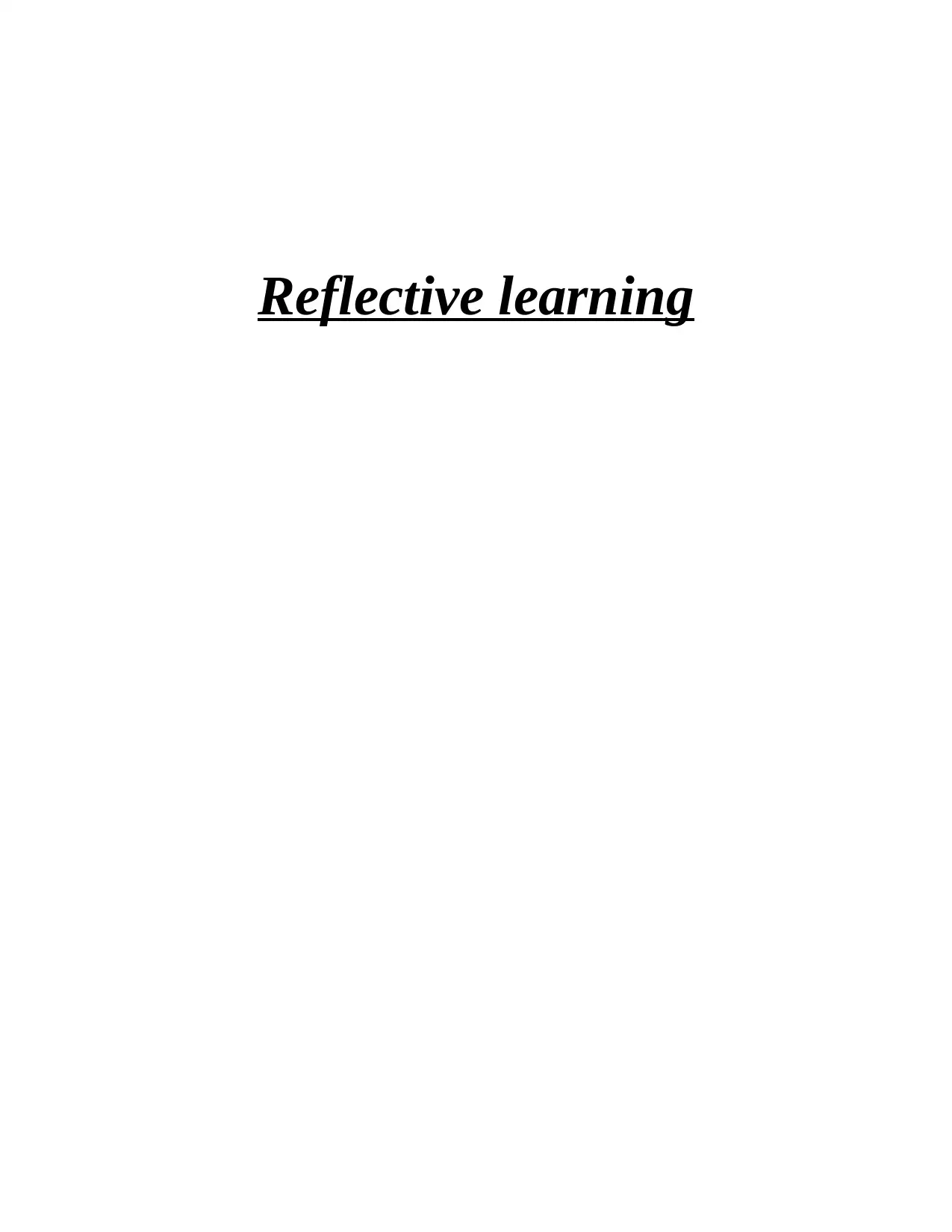
Reflective learning
Paraphrase This Document
Need a fresh take? Get an instant paraphrase of this document with our AI Paraphraser
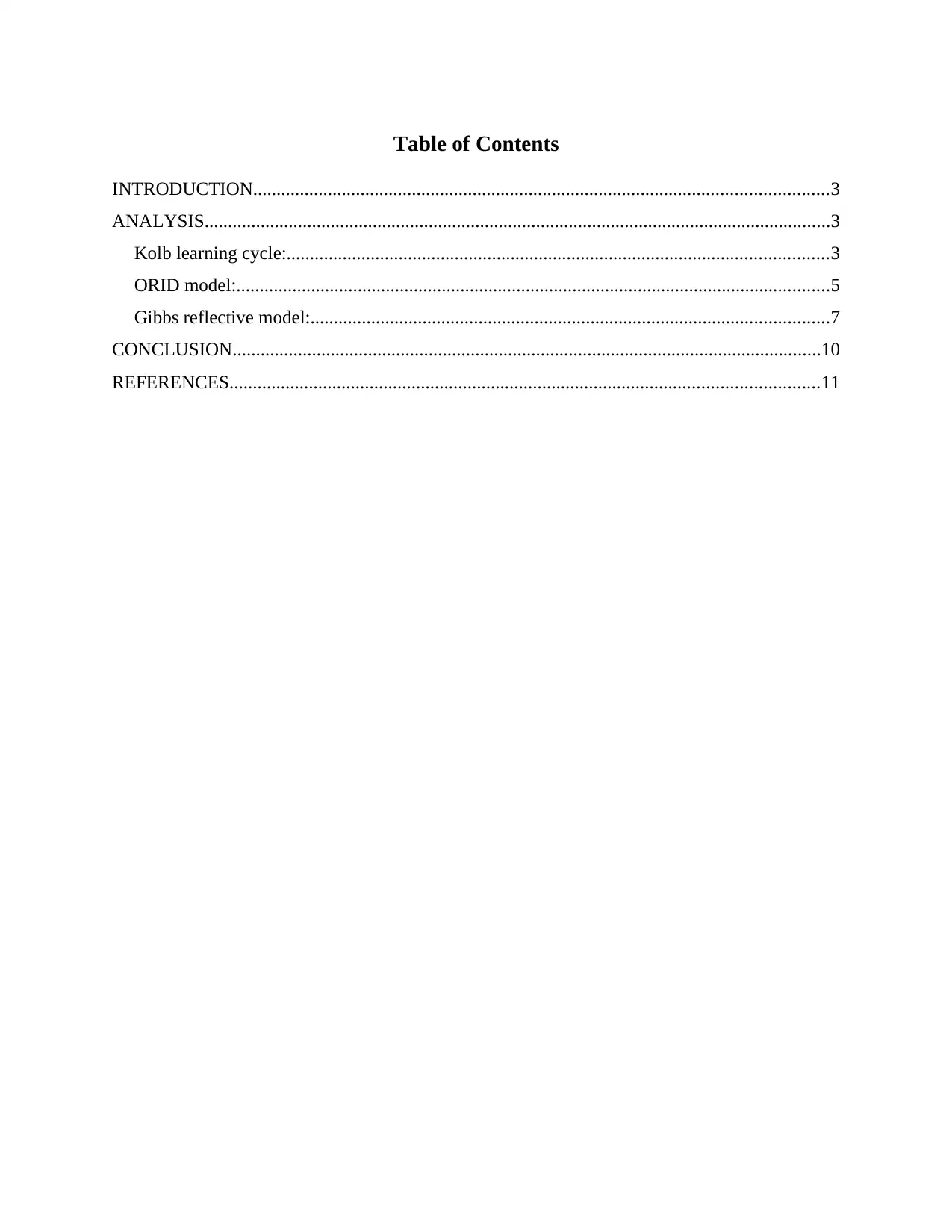
Table of Contents
INTRODUCTION...........................................................................................................................3
ANALYSIS......................................................................................................................................3
Kolb learning cycle:....................................................................................................................3
ORID model:...............................................................................................................................5
Gibbs reflective model:...............................................................................................................7
CONCLUSION..............................................................................................................................10
REFERENCES..............................................................................................................................11
INTRODUCTION...........................................................................................................................3
ANALYSIS......................................................................................................................................3
Kolb learning cycle:....................................................................................................................3
ORID model:...............................................................................................................................5
Gibbs reflective model:...............................................................................................................7
CONCLUSION..............................................................................................................................10
REFERENCES..............................................................................................................................11
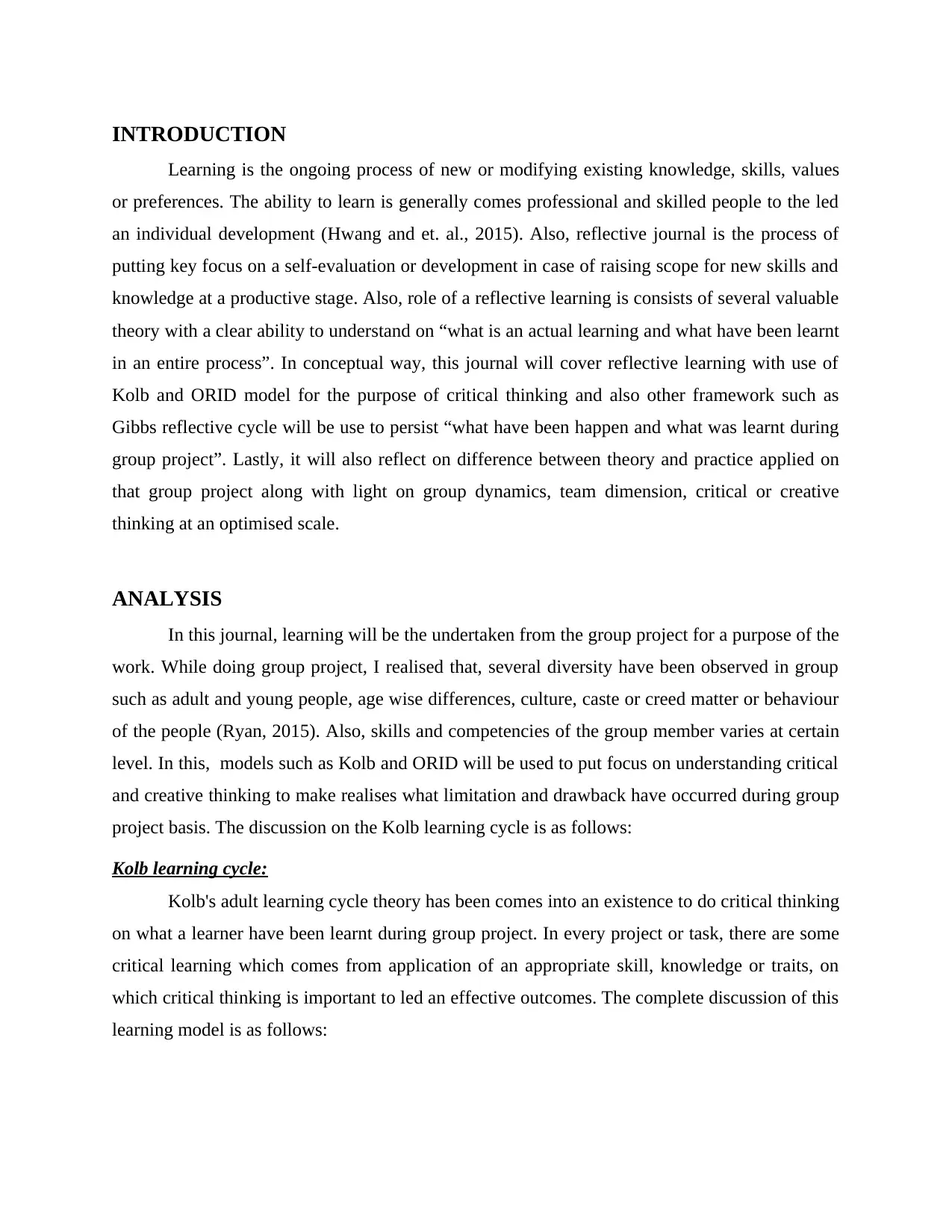
INTRODUCTION
Learning is the ongoing process of new or modifying existing knowledge, skills, values
or preferences. The ability to learn is generally comes professional and skilled people to the led
an individual development (Hwang and et. al., 2015). Also, reflective journal is the process of
putting key focus on a self-evaluation or development in case of raising scope for new skills and
knowledge at a productive stage. Also, role of a reflective learning is consists of several valuable
theory with a clear ability to understand on “what is an actual learning and what have been learnt
in an entire process”. In conceptual way, this journal will cover reflective learning with use of
Kolb and ORID model for the purpose of critical thinking and also other framework such as
Gibbs reflective cycle will be use to persist “what have been happen and what was learnt during
group project”. Lastly, it will also reflect on difference between theory and practice applied on
that group project along with light on group dynamics, team dimension, critical or creative
thinking at an optimised scale.
ANALYSIS
In this journal, learning will be the undertaken from the group project for a purpose of the
work. While doing group project, I realised that, several diversity have been observed in group
such as adult and young people, age wise differences, culture, caste or creed matter or behaviour
of the people (Ryan, 2015). Also, skills and competencies of the group member varies at certain
level. In this, models such as Kolb and ORID will be used to put focus on understanding critical
and creative thinking to make realises what limitation and drawback have occurred during group
project basis. The discussion on the Kolb learning cycle is as follows:
Kolb learning cycle:
Kolb's adult learning cycle theory has been comes into an existence to do critical thinking
on what a learner have been learnt during group project. In every project or task, there are some
critical learning which comes from application of an appropriate skill, knowledge or traits, on
which critical thinking is important to led an effective outcomes. The complete discussion of this
learning model is as follows:
Learning is the ongoing process of new or modifying existing knowledge, skills, values
or preferences. The ability to learn is generally comes professional and skilled people to the led
an individual development (Hwang and et. al., 2015). Also, reflective journal is the process of
putting key focus on a self-evaluation or development in case of raising scope for new skills and
knowledge at a productive stage. Also, role of a reflective learning is consists of several valuable
theory with a clear ability to understand on “what is an actual learning and what have been learnt
in an entire process”. In conceptual way, this journal will cover reflective learning with use of
Kolb and ORID model for the purpose of critical thinking and also other framework such as
Gibbs reflective cycle will be use to persist “what have been happen and what was learnt during
group project”. Lastly, it will also reflect on difference between theory and practice applied on
that group project along with light on group dynamics, team dimension, critical or creative
thinking at an optimised scale.
ANALYSIS
In this journal, learning will be the undertaken from the group project for a purpose of the
work. While doing group project, I realised that, several diversity have been observed in group
such as adult and young people, age wise differences, culture, caste or creed matter or behaviour
of the people (Ryan, 2015). Also, skills and competencies of the group member varies at certain
level. In this, models such as Kolb and ORID will be used to put focus on understanding critical
and creative thinking to make realises what limitation and drawback have occurred during group
project basis. The discussion on the Kolb learning cycle is as follows:
Kolb learning cycle:
Kolb's adult learning cycle theory has been comes into an existence to do critical thinking
on what a learner have been learnt during group project. In every project or task, there are some
critical learning which comes from application of an appropriate skill, knowledge or traits, on
which critical thinking is important to led an effective outcomes. The complete discussion of this
learning model is as follows:
⊘ This is a preview!⊘
Do you want full access?
Subscribe today to unlock all pages.

Trusted by 1+ million students worldwide
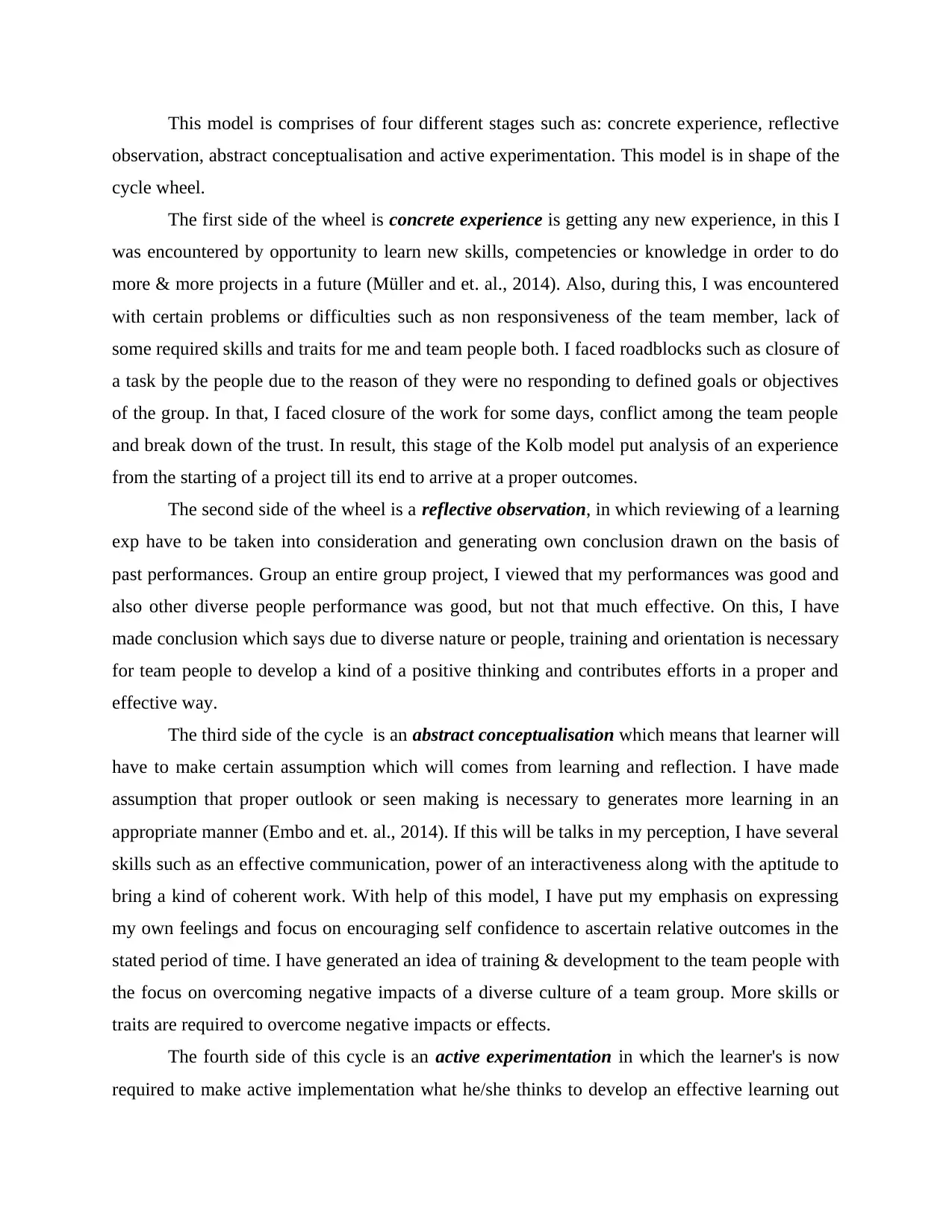
This model is comprises of four different stages such as: concrete experience, reflective
observation, abstract conceptualisation and active experimentation. This model is in shape of the
cycle wheel.
The first side of the wheel is concrete experience is getting any new experience, in this I
was encountered by opportunity to learn new skills, competencies or knowledge in order to do
more & more projects in a future (Müller and et. al., 2014). Also, during this, I was encountered
with certain problems or difficulties such as non responsiveness of the team member, lack of
some required skills and traits for me and team people both. I faced roadblocks such as closure of
a task by the people due to the reason of they were no responding to defined goals or objectives
of the group. In that, I faced closure of the work for some days, conflict among the team people
and break down of the trust. In result, this stage of the Kolb model put analysis of an experience
from the starting of a project till its end to arrive at a proper outcomes.
The second side of the wheel is a reflective observation, in which reviewing of a learning
exp have to be taken into consideration and generating own conclusion drawn on the basis of
past performances. Group an entire group project, I viewed that my performances was good and
also other diverse people performance was good, but not that much effective. On this, I have
made conclusion which says due to diverse nature or people, training and orientation is necessary
for team people to develop a kind of a positive thinking and contributes efforts in a proper and
effective way.
The third side of the cycle is an abstract conceptualisation which means that learner will
have to make certain assumption which will comes from learning and reflection. I have made
assumption that proper outlook or seen making is necessary to generates more learning in an
appropriate manner (Embo and et. al., 2014). If this will be talks in my perception, I have several
skills such as an effective communication, power of an interactiveness along with the aptitude to
bring a kind of coherent work. With help of this model, I have put my emphasis on expressing
my own feelings and focus on encouraging self confidence to ascertain relative outcomes in the
stated period of time. I have generated an idea of training & development to the team people with
the focus on overcoming negative impacts of a diverse culture of a team group. More skills or
traits are required to overcome negative impacts or effects.
The fourth side of this cycle is an active experimentation in which the learner's is now
required to make active implementation what he/she thinks to develop an effective learning out
observation, abstract conceptualisation and active experimentation. This model is in shape of the
cycle wheel.
The first side of the wheel is concrete experience is getting any new experience, in this I
was encountered by opportunity to learn new skills, competencies or knowledge in order to do
more & more projects in a future (Müller and et. al., 2014). Also, during this, I was encountered
with certain problems or difficulties such as non responsiveness of the team member, lack of
some required skills and traits for me and team people both. I faced roadblocks such as closure of
a task by the people due to the reason of they were no responding to defined goals or objectives
of the group. In that, I faced closure of the work for some days, conflict among the team people
and break down of the trust. In result, this stage of the Kolb model put analysis of an experience
from the starting of a project till its end to arrive at a proper outcomes.
The second side of the wheel is a reflective observation, in which reviewing of a learning
exp have to be taken into consideration and generating own conclusion drawn on the basis of
past performances. Group an entire group project, I viewed that my performances was good and
also other diverse people performance was good, but not that much effective. On this, I have
made conclusion which says due to diverse nature or people, training and orientation is necessary
for team people to develop a kind of a positive thinking and contributes efforts in a proper and
effective way.
The third side of the cycle is an abstract conceptualisation which means that learner will
have to make certain assumption which will comes from learning and reflection. I have made
assumption that proper outlook or seen making is necessary to generates more learning in an
appropriate manner (Embo and et. al., 2014). If this will be talks in my perception, I have several
skills such as an effective communication, power of an interactiveness along with the aptitude to
bring a kind of coherent work. With help of this model, I have put my emphasis on expressing
my own feelings and focus on encouraging self confidence to ascertain relative outcomes in the
stated period of time. I have generated an idea of training & development to the team people with
the focus on overcoming negative impacts of a diverse culture of a team group. More skills or
traits are required to overcome negative impacts or effects.
The fourth side of this cycle is an active experimentation in which the learner's is now
required to make active implementation what he/she thinks to develop an effective learning out
Paraphrase This Document
Need a fresh take? Get an instant paraphrase of this document with our AI Paraphraser
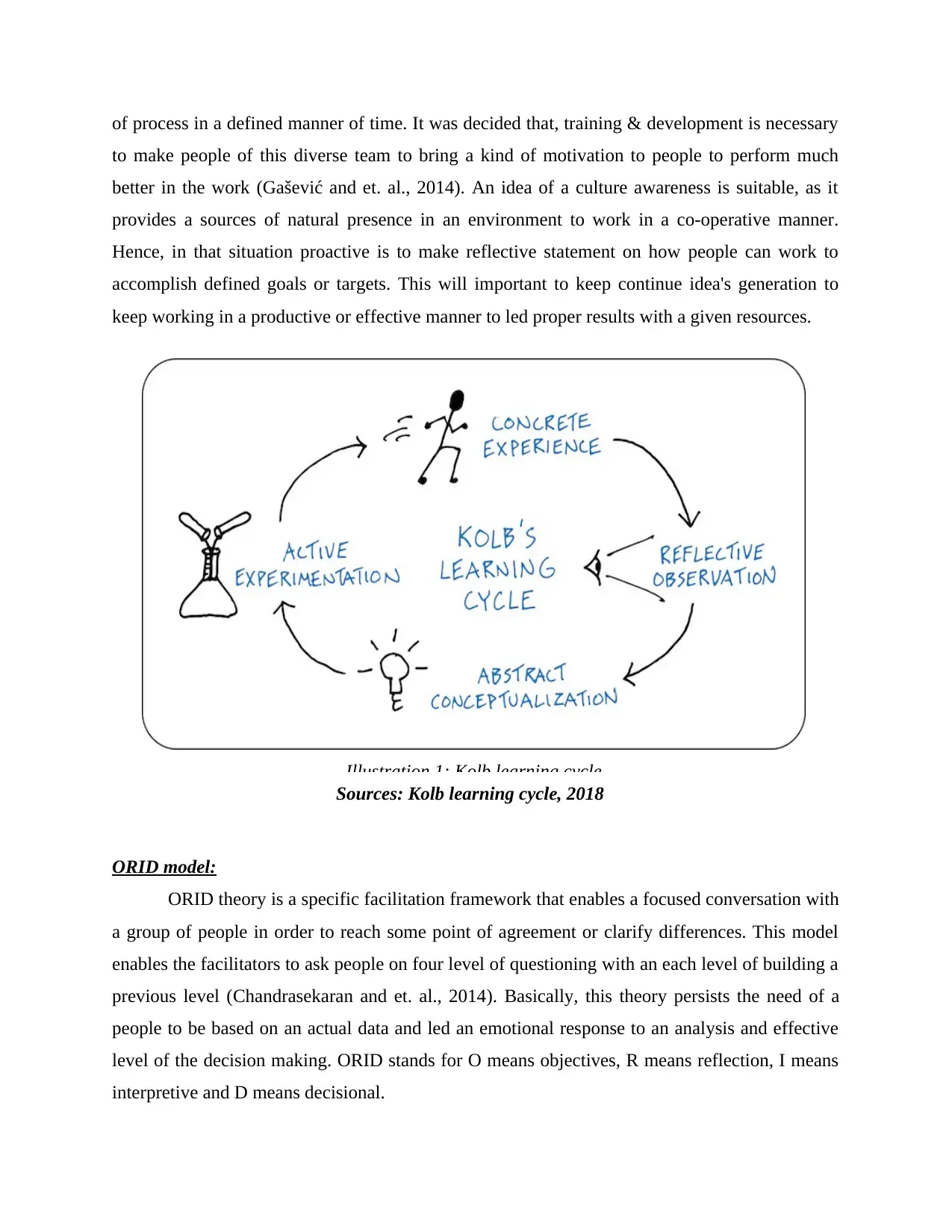
of process in a defined manner of time. It was decided that, training & development is necessary
to make people of this diverse team to bring a kind of motivation to people to perform much
better in the work (Gašević and et. al., 2014). An idea of a culture awareness is suitable, as it
provides a sources of natural presence in an environment to work in a co-operative manner.
Hence, in that situation proactive is to make reflective statement on how people can work to
accomplish defined goals or targets. This will important to keep continue idea's generation to
keep working in a productive or effective manner to led proper results with a given resources.
Sources: Kolb learning cycle, 2018
ORID model:
ORID theory is a specific facilitation framework that enables a focused conversation with
a group of people in order to reach some point of agreement or clarify differences. This model
enables the facilitators to ask people on four level of questioning with an each level of building a
previous level (Chandrasekaran and et. al., 2014). Basically, this theory persists the need of a
people to be based on an actual data and led an emotional response to an analysis and effective
level of the decision making. ORID stands for O means objectives, R means reflection, I means
interpretive and D means decisional.
Illustration 1: Kolb learning cycle
to make people of this diverse team to bring a kind of motivation to people to perform much
better in the work (Gašević and et. al., 2014). An idea of a culture awareness is suitable, as it
provides a sources of natural presence in an environment to work in a co-operative manner.
Hence, in that situation proactive is to make reflective statement on how people can work to
accomplish defined goals or targets. This will important to keep continue idea's generation to
keep working in a productive or effective manner to led proper results with a given resources.
Sources: Kolb learning cycle, 2018
ORID model:
ORID theory is a specific facilitation framework that enables a focused conversation with
a group of people in order to reach some point of agreement or clarify differences. This model
enables the facilitators to ask people on four level of questioning with an each level of building a
previous level (Chandrasekaran and et. al., 2014). Basically, this theory persists the need of a
people to be based on an actual data and led an emotional response to an analysis and effective
level of the decision making. ORID stands for O means objectives, R means reflection, I means
interpretive and D means decisional.
Illustration 1: Kolb learning cycle
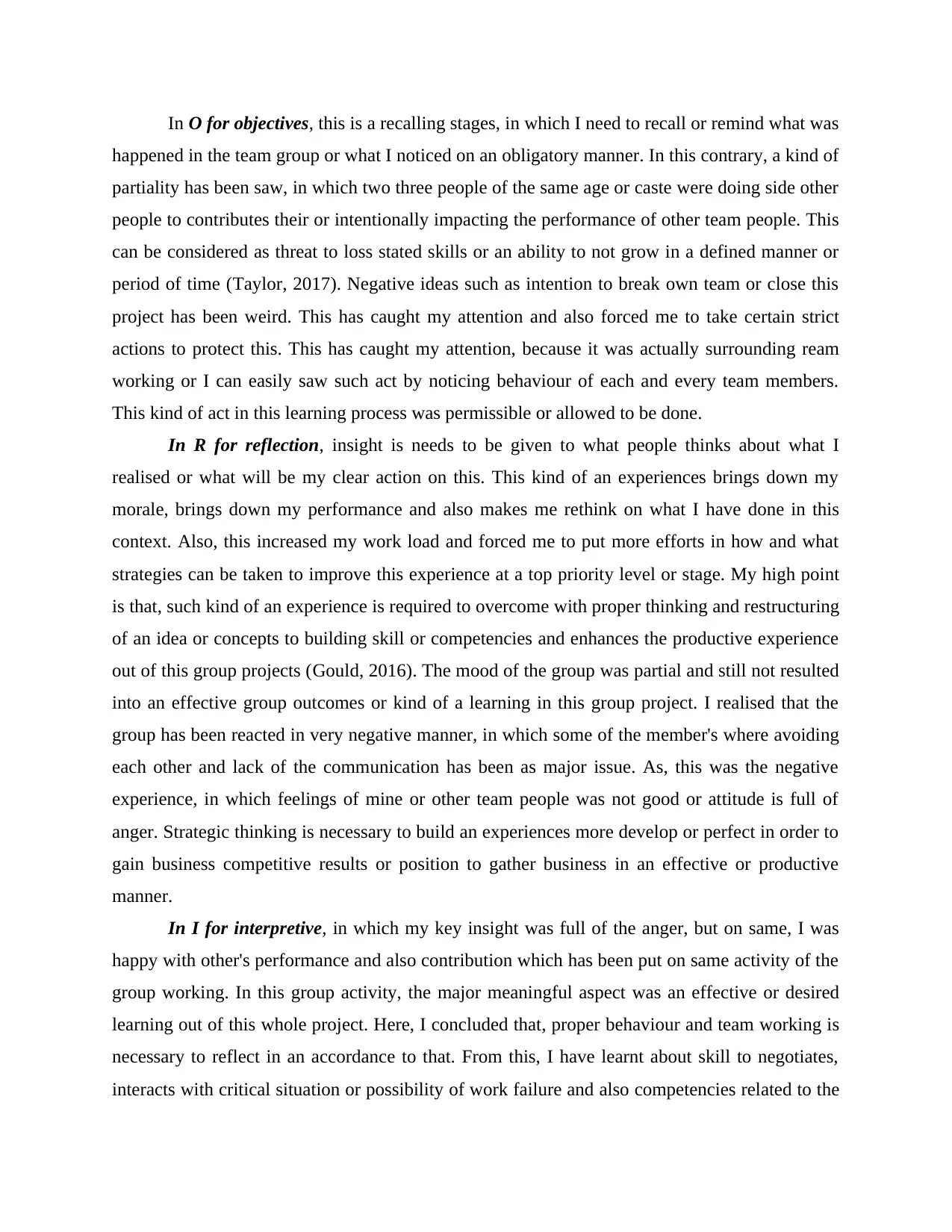
In O for objectives, this is a recalling stages, in which I need to recall or remind what was
happened in the team group or what I noticed on an obligatory manner. In this contrary, a kind of
partiality has been saw, in which two three people of the same age or caste were doing side other
people to contributes their or intentionally impacting the performance of other team people. This
can be considered as threat to loss stated skills or an ability to not grow in a defined manner or
period of time (Taylor, 2017). Negative ideas such as intention to break own team or close this
project has been weird. This has caught my attention and also forced me to take certain strict
actions to protect this. This has caught my attention, because it was actually surrounding ream
working or I can easily saw such act by noticing behaviour of each and every team members.
This kind of act in this learning process was permissible or allowed to be done.
In R for reflection, insight is needs to be given to what people thinks about what I
realised or what will be my clear action on this. This kind of an experiences brings down my
morale, brings down my performance and also makes me rethink on what I have done in this
context. Also, this increased my work load and forced me to put more efforts in how and what
strategies can be taken to improve this experience at a top priority level or stage. My high point
is that, such kind of an experience is required to overcome with proper thinking and restructuring
of an idea or concepts to building skill or competencies and enhances the productive experience
out of this group projects (Gould, 2016). The mood of the group was partial and still not resulted
into an effective group outcomes or kind of a learning in this group project. I realised that the
group has been reacted in very negative manner, in which some of the member's where avoiding
each other and lack of the communication has been as major issue. As, this was the negative
experience, in which feelings of mine or other team people was not good or attitude is full of
anger. Strategic thinking is necessary to build an experiences more develop or perfect in order to
gain business competitive results or position to gather business in an effective or productive
manner.
In I for interpretive, in which my key insight was full of the anger, but on same, I was
happy with other's performance and also contribution which has been put on same activity of the
group working. In this group activity, the major meaningful aspect was an effective or desired
learning out of this whole project. Here, I concluded that, proper behaviour and team working is
necessary to reflect in an accordance to that. From this, I have learnt about skill to negotiates,
interacts with critical situation or possibility of work failure and also competencies related to the
happened in the team group or what I noticed on an obligatory manner. In this contrary, a kind of
partiality has been saw, in which two three people of the same age or caste were doing side other
people to contributes their or intentionally impacting the performance of other team people. This
can be considered as threat to loss stated skills or an ability to not grow in a defined manner or
period of time (Taylor, 2017). Negative ideas such as intention to break own team or close this
project has been weird. This has caught my attention and also forced me to take certain strict
actions to protect this. This has caught my attention, because it was actually surrounding ream
working or I can easily saw such act by noticing behaviour of each and every team members.
This kind of act in this learning process was permissible or allowed to be done.
In R for reflection, insight is needs to be given to what people thinks about what I
realised or what will be my clear action on this. This kind of an experiences brings down my
morale, brings down my performance and also makes me rethink on what I have done in this
context. Also, this increased my work load and forced me to put more efforts in how and what
strategies can be taken to improve this experience at a top priority level or stage. My high point
is that, such kind of an experience is required to overcome with proper thinking and restructuring
of an idea or concepts to building skill or competencies and enhances the productive experience
out of this group projects (Gould, 2016). The mood of the group was partial and still not resulted
into an effective group outcomes or kind of a learning in this group project. I realised that the
group has been reacted in very negative manner, in which some of the member's where avoiding
each other and lack of the communication has been as major issue. As, this was the negative
experience, in which feelings of mine or other team people was not good or attitude is full of
anger. Strategic thinking is necessary to build an experiences more develop or perfect in order to
gain business competitive results or position to gather business in an effective or productive
manner.
In I for interpretive, in which my key insight was full of the anger, but on same, I was
happy with other's performance and also contribution which has been put on same activity of the
group working. In this group activity, the major meaningful aspect was an effective or desired
learning out of this whole project. Here, I concluded that, proper behaviour and team working is
necessary to reflect in an accordance to that. From this, I have learnt about skill to negotiates,
interacts with critical situation or possibility of work failure and also competencies related to the
⊘ This is a preview!⊘
Do you want full access?
Subscribe today to unlock all pages.

Trusted by 1+ million students worldwide
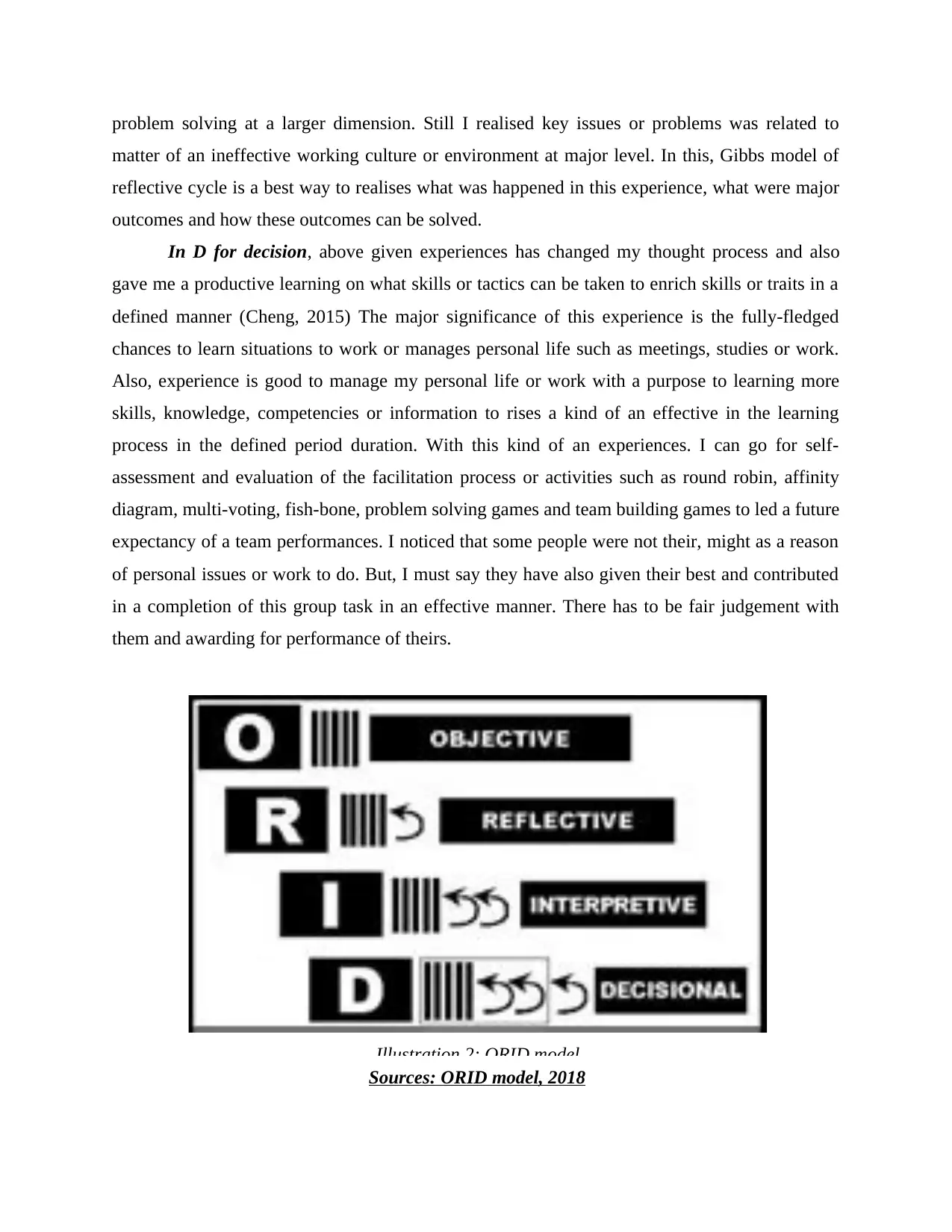
problem solving at a larger dimension. Still I realised key issues or problems was related to
matter of an ineffective working culture or environment at major level. In this, Gibbs model of
reflective cycle is a best way to realises what was happened in this experience, what were major
outcomes and how these outcomes can be solved.
In D for decision, above given experiences has changed my thought process and also
gave me a productive learning on what skills or tactics can be taken to enrich skills or traits in a
defined manner (Cheng, 2015) The major significance of this experience is the fully-fledged
chances to learn situations to work or manages personal life such as meetings, studies or work.
Also, experience is good to manage my personal life or work with a purpose to learning more
skills, knowledge, competencies or information to rises a kind of an effective in the learning
process in the defined period duration. With this kind of an experiences. I can go for self-
assessment and evaluation of the facilitation process or activities such as round robin, affinity
diagram, multi-voting, fish-bone, problem solving games and team building games to led a future
expectancy of a team performances. I noticed that some people were not their, might as a reason
of personal issues or work to do. But, I must say they have also given their best and contributed
in a completion of this group task in an effective manner. There has to be fair judgement with
them and awarding for performance of theirs.
Sources: ORID model, 2018
Illustration 2: ORID model
matter of an ineffective working culture or environment at major level. In this, Gibbs model of
reflective cycle is a best way to realises what was happened in this experience, what were major
outcomes and how these outcomes can be solved.
In D for decision, above given experiences has changed my thought process and also
gave me a productive learning on what skills or tactics can be taken to enrich skills or traits in a
defined manner (Cheng, 2015) The major significance of this experience is the fully-fledged
chances to learn situations to work or manages personal life such as meetings, studies or work.
Also, experience is good to manage my personal life or work with a purpose to learning more
skills, knowledge, competencies or information to rises a kind of an effective in the learning
process in the defined period duration. With this kind of an experiences. I can go for self-
assessment and evaluation of the facilitation process or activities such as round robin, affinity
diagram, multi-voting, fish-bone, problem solving games and team building games to led a future
expectancy of a team performances. I noticed that some people were not their, might as a reason
of personal issues or work to do. But, I must say they have also given their best and contributed
in a completion of this group task in an effective manner. There has to be fair judgement with
them and awarding for performance of theirs.
Sources: ORID model, 2018
Illustration 2: ORID model
Paraphrase This Document
Need a fresh take? Get an instant paraphrase of this document with our AI Paraphraser
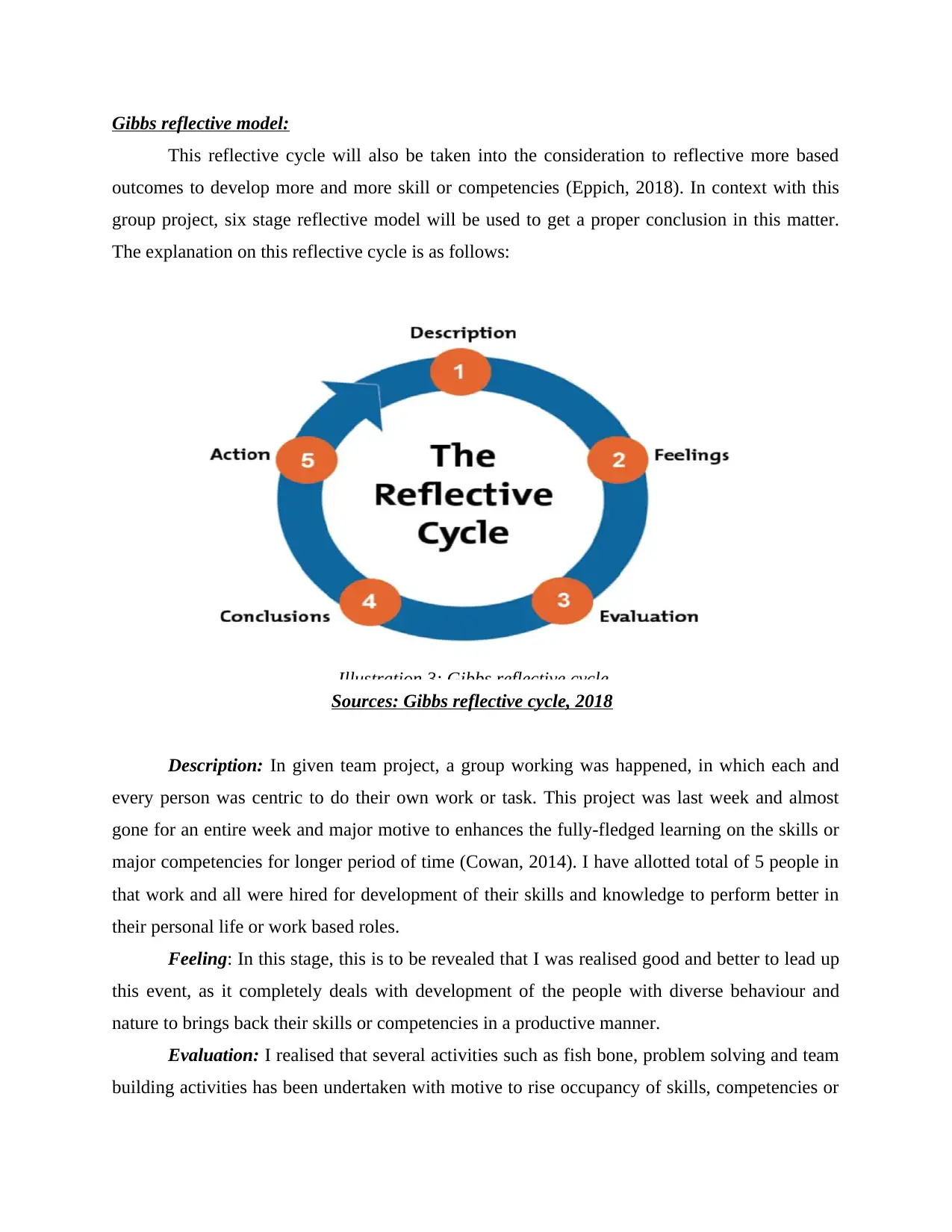
Gibbs reflective model:
This reflective cycle will also be taken into the consideration to reflective more based
outcomes to develop more and more skill or competencies (Eppich, 2018). In context with this
group project, six stage reflective model will be used to get a proper conclusion in this matter.
The explanation on this reflective cycle is as follows:
Sources: Gibbs reflective cycle, 2018
Description: In given team project, a group working was happened, in which each and
every person was centric to do their own work or task. This project was last week and almost
gone for an entire week and major motive to enhances the fully-fledged learning on the skills or
major competencies for longer period of time (Cowan, 2014). I have allotted total of 5 people in
that work and all were hired for development of their skills and knowledge to perform better in
their personal life or work based roles.
Feeling: In this stage, this is to be revealed that I was realised good and better to lead up
this event, as it completely deals with development of the people with diverse behaviour and
nature to brings back their skills or competencies in a productive manner.
Evaluation: I realised that several activities such as fish bone, problem solving and team
building activities has been undertaken with motive to rise occupancy of skills, competencies or
Illustration 3: Gibbs reflective cycle
This reflective cycle will also be taken into the consideration to reflective more based
outcomes to develop more and more skill or competencies (Eppich, 2018). In context with this
group project, six stage reflective model will be used to get a proper conclusion in this matter.
The explanation on this reflective cycle is as follows:
Sources: Gibbs reflective cycle, 2018
Description: In given team project, a group working was happened, in which each and
every person was centric to do their own work or task. This project was last week and almost
gone for an entire week and major motive to enhances the fully-fledged learning on the skills or
major competencies for longer period of time (Cowan, 2014). I have allotted total of 5 people in
that work and all were hired for development of their skills and knowledge to perform better in
their personal life or work based roles.
Feeling: In this stage, this is to be revealed that I was realised good and better to lead up
this event, as it completely deals with development of the people with diverse behaviour and
nature to brings back their skills or competencies in a productive manner.
Evaluation: I realised that several activities such as fish bone, problem solving and team
building activities has been undertaken with motive to rise occupancy of skills, competencies or
Illustration 3: Gibbs reflective cycle
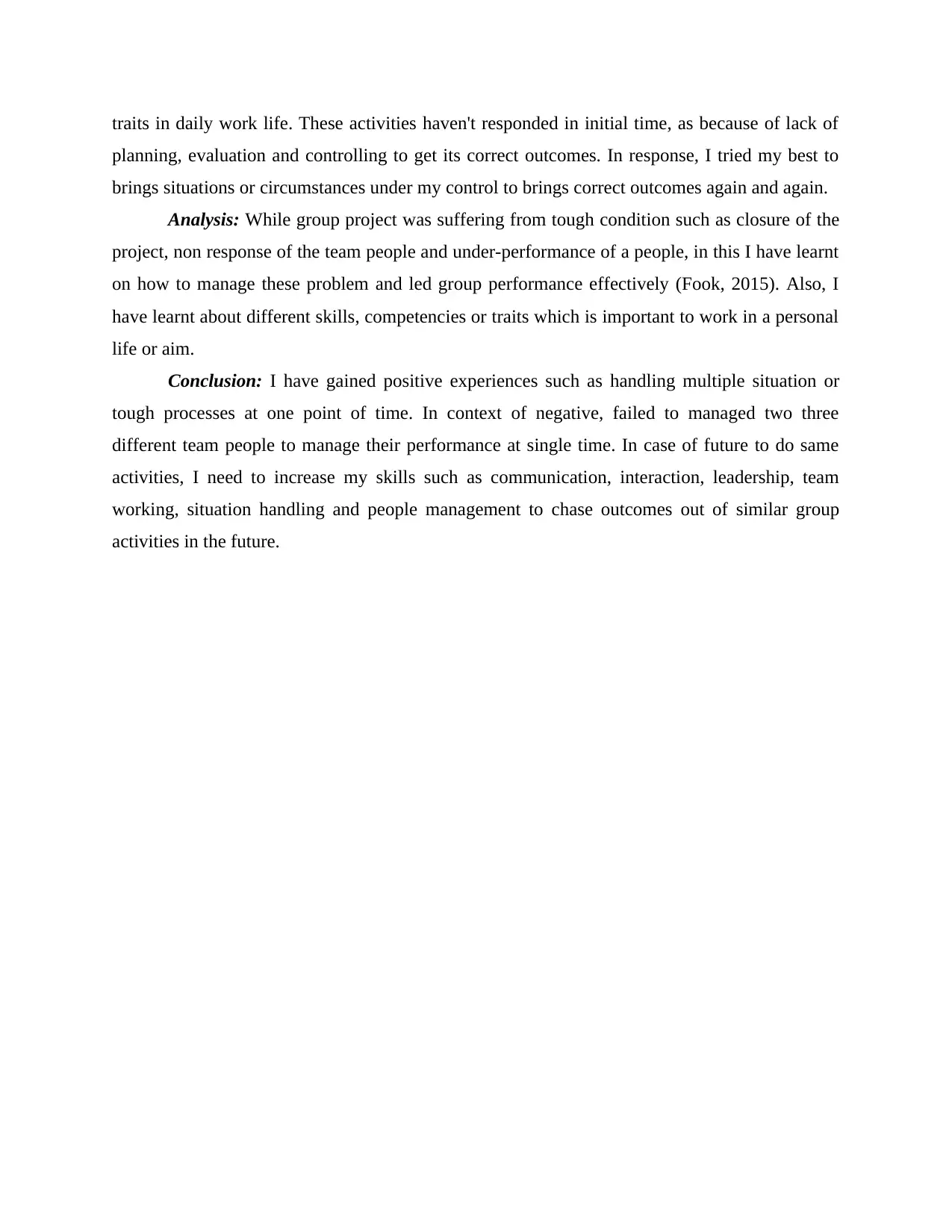
traits in daily work life. These activities haven't responded in initial time, as because of lack of
planning, evaluation and controlling to get its correct outcomes. In response, I tried my best to
brings situations or circumstances under my control to brings correct outcomes again and again.
Analysis: While group project was suffering from tough condition such as closure of the
project, non response of the team people and under-performance of a people, in this I have learnt
on how to manage these problem and led group performance effectively (Fook, 2015). Also, I
have learnt about different skills, competencies or traits which is important to work in a personal
life or aim.
Conclusion: I have gained positive experiences such as handling multiple situation or
tough processes at one point of time. In context of negative, failed to managed two three
different team people to manage their performance at single time. In case of future to do same
activities, I need to increase my skills such as communication, interaction, leadership, team
working, situation handling and people management to chase outcomes out of similar group
activities in the future.
planning, evaluation and controlling to get its correct outcomes. In response, I tried my best to
brings situations or circumstances under my control to brings correct outcomes again and again.
Analysis: While group project was suffering from tough condition such as closure of the
project, non response of the team people and under-performance of a people, in this I have learnt
on how to manage these problem and led group performance effectively (Fook, 2015). Also, I
have learnt about different skills, competencies or traits which is important to work in a personal
life or aim.
Conclusion: I have gained positive experiences such as handling multiple situation or
tough processes at one point of time. In context of negative, failed to managed two three
different team people to manage their performance at single time. In case of future to do same
activities, I need to increase my skills such as communication, interaction, leadership, team
working, situation handling and people management to chase outcomes out of similar group
activities in the future.
⊘ This is a preview!⊘
Do you want full access?
Subscribe today to unlock all pages.

Trusted by 1+ million students worldwide
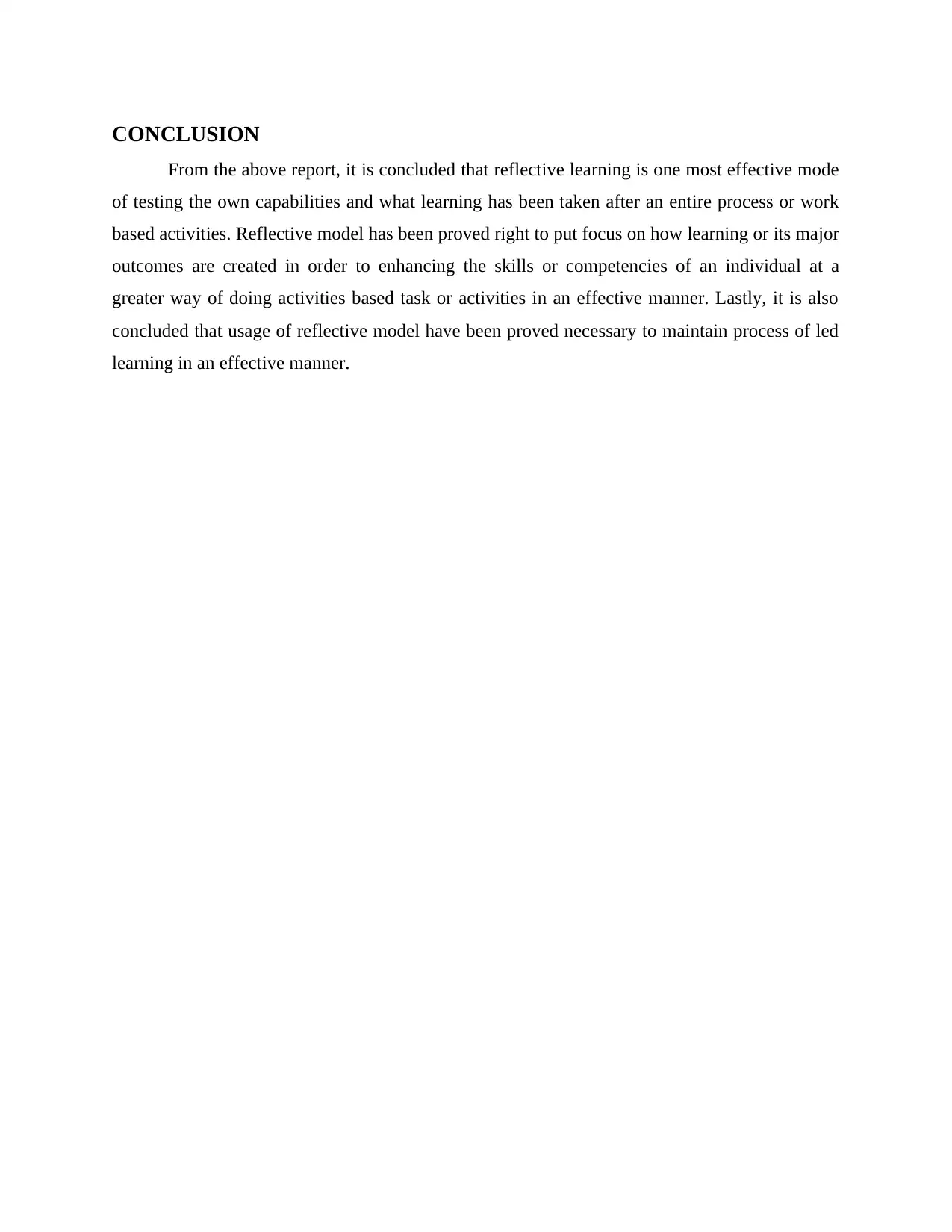
CONCLUSION
From the above report, it is concluded that reflective learning is one most effective mode
of testing the own capabilities and what learning has been taken after an entire process or work
based activities. Reflective model has been proved right to put focus on how learning or its major
outcomes are created in order to enhancing the skills or competencies of an individual at a
greater way of doing activities based task or activities in an effective manner. Lastly, it is also
concluded that usage of reflective model have been proved necessary to maintain process of led
learning in an effective manner.
From the above report, it is concluded that reflective learning is one most effective mode
of testing the own capabilities and what learning has been taken after an entire process or work
based activities. Reflective model has been proved right to put focus on how learning or its major
outcomes are created in order to enhancing the skills or competencies of an individual at a
greater way of doing activities based task or activities in an effective manner. Lastly, it is also
concluded that usage of reflective model have been proved necessary to maintain process of led
learning in an effective manner.
Paraphrase This Document
Need a fresh take? Get an instant paraphrase of this document with our AI Paraphraser
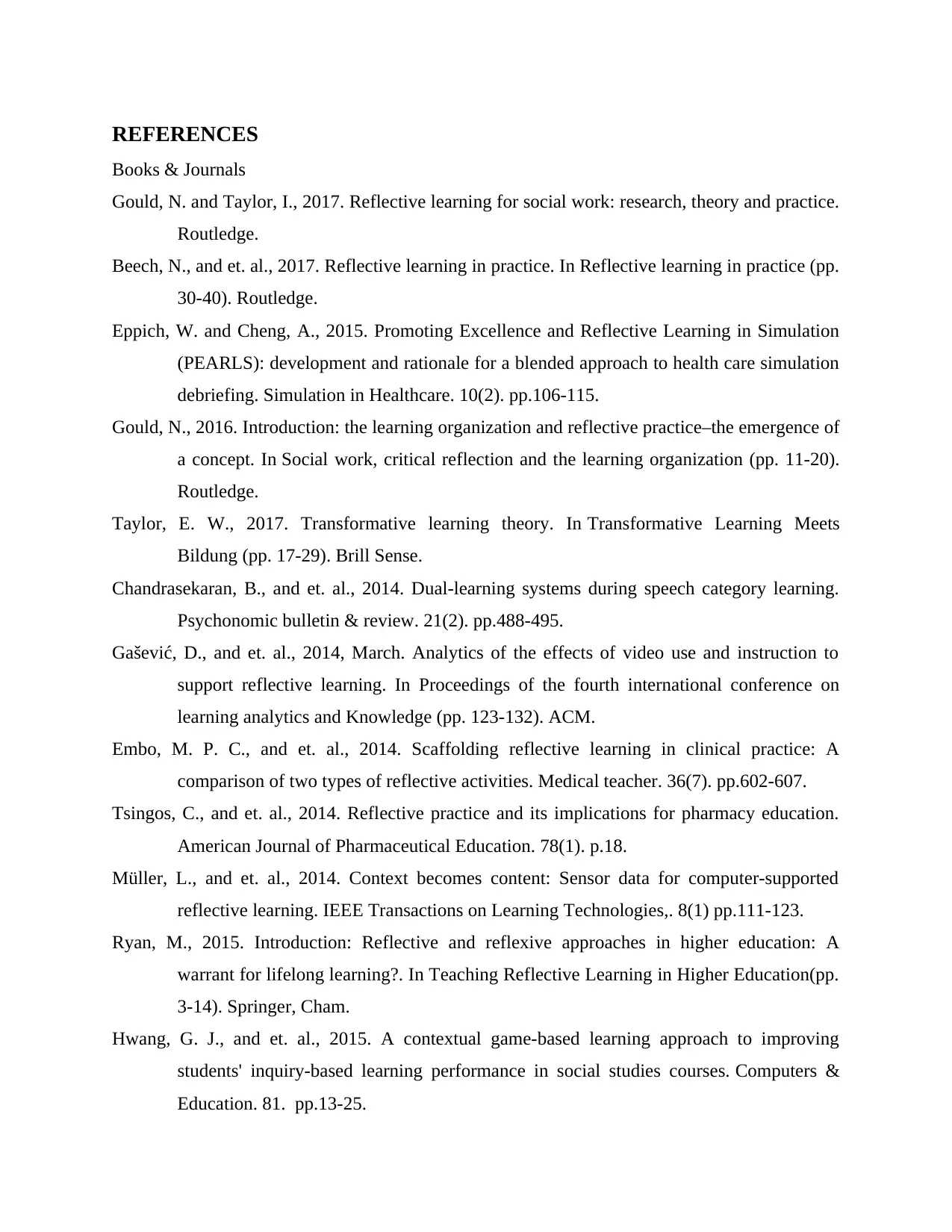
REFERENCES
Books & Journals
Gould, N. and Taylor, I., 2017. Reflective learning for social work: research, theory and practice.
Routledge.
Beech, N., and et. al., 2017. Reflective learning in practice. In Reflective learning in practice (pp.
30-40). Routledge.
Eppich, W. and Cheng, A., 2015. Promoting Excellence and Reflective Learning in Simulation
(PEARLS): development and rationale for a blended approach to health care simulation
debriefing. Simulation in Healthcare. 10(2). pp.106-115.
Gould, N., 2016. Introduction: the learning organization and reflective practice–the emergence of
a concept. In Social work, critical reflection and the learning organization (pp. 11-20).
Routledge.
Taylor, E. W., 2017. Transformative learning theory. In Transformative Learning Meets
Bildung (pp. 17-29). Brill Sense.
Chandrasekaran, B., and et. al., 2014. Dual-learning systems during speech category learning.
Psychonomic bulletin & review. 21(2). pp.488-495.
Gašević, D., and et. al., 2014, March. Analytics of the effects of video use and instruction to
support reflective learning. In Proceedings of the fourth international conference on
learning analytics and Knowledge (pp. 123-132). ACM.
Embo, M. P. C., and et. al., 2014. Scaffolding reflective learning in clinical practice: A
comparison of two types of reflective activities. Medical teacher. 36(7). pp.602-607.
Tsingos, C., and et. al., 2014. Reflective practice and its implications for pharmacy education.
American Journal of Pharmaceutical Education. 78(1). p.18.
Müller, L., and et. al., 2014. Context becomes content: Sensor data for computer-supported
reflective learning. IEEE Transactions on Learning Technologies,. 8(1) pp.111-123.
Ryan, M., 2015. Introduction: Reflective and reflexive approaches in higher education: A
warrant for lifelong learning?. In Teaching Reflective Learning in Higher Education(pp.
3-14). Springer, Cham.
Hwang, G. J., and et. al., 2015. A contextual game-based learning approach to improving
students' inquiry-based learning performance in social studies courses. Computers &
Education. 81. pp.13-25.
Books & Journals
Gould, N. and Taylor, I., 2017. Reflective learning for social work: research, theory and practice.
Routledge.
Beech, N., and et. al., 2017. Reflective learning in practice. In Reflective learning in practice (pp.
30-40). Routledge.
Eppich, W. and Cheng, A., 2015. Promoting Excellence and Reflective Learning in Simulation
(PEARLS): development and rationale for a blended approach to health care simulation
debriefing. Simulation in Healthcare. 10(2). pp.106-115.
Gould, N., 2016. Introduction: the learning organization and reflective practice–the emergence of
a concept. In Social work, critical reflection and the learning organization (pp. 11-20).
Routledge.
Taylor, E. W., 2017. Transformative learning theory. In Transformative Learning Meets
Bildung (pp. 17-29). Brill Sense.
Chandrasekaran, B., and et. al., 2014. Dual-learning systems during speech category learning.
Psychonomic bulletin & review. 21(2). pp.488-495.
Gašević, D., and et. al., 2014, March. Analytics of the effects of video use and instruction to
support reflective learning. In Proceedings of the fourth international conference on
learning analytics and Knowledge (pp. 123-132). ACM.
Embo, M. P. C., and et. al., 2014. Scaffolding reflective learning in clinical practice: A
comparison of two types of reflective activities. Medical teacher. 36(7). pp.602-607.
Tsingos, C., and et. al., 2014. Reflective practice and its implications for pharmacy education.
American Journal of Pharmaceutical Education. 78(1). p.18.
Müller, L., and et. al., 2014. Context becomes content: Sensor data for computer-supported
reflective learning. IEEE Transactions on Learning Technologies,. 8(1) pp.111-123.
Ryan, M., 2015. Introduction: Reflective and reflexive approaches in higher education: A
warrant for lifelong learning?. In Teaching Reflective Learning in Higher Education(pp.
3-14). Springer, Cham.
Hwang, G. J., and et. al., 2015. A contextual game-based learning approach to improving
students' inquiry-based learning performance in social studies courses. Computers &
Education. 81. pp.13-25.
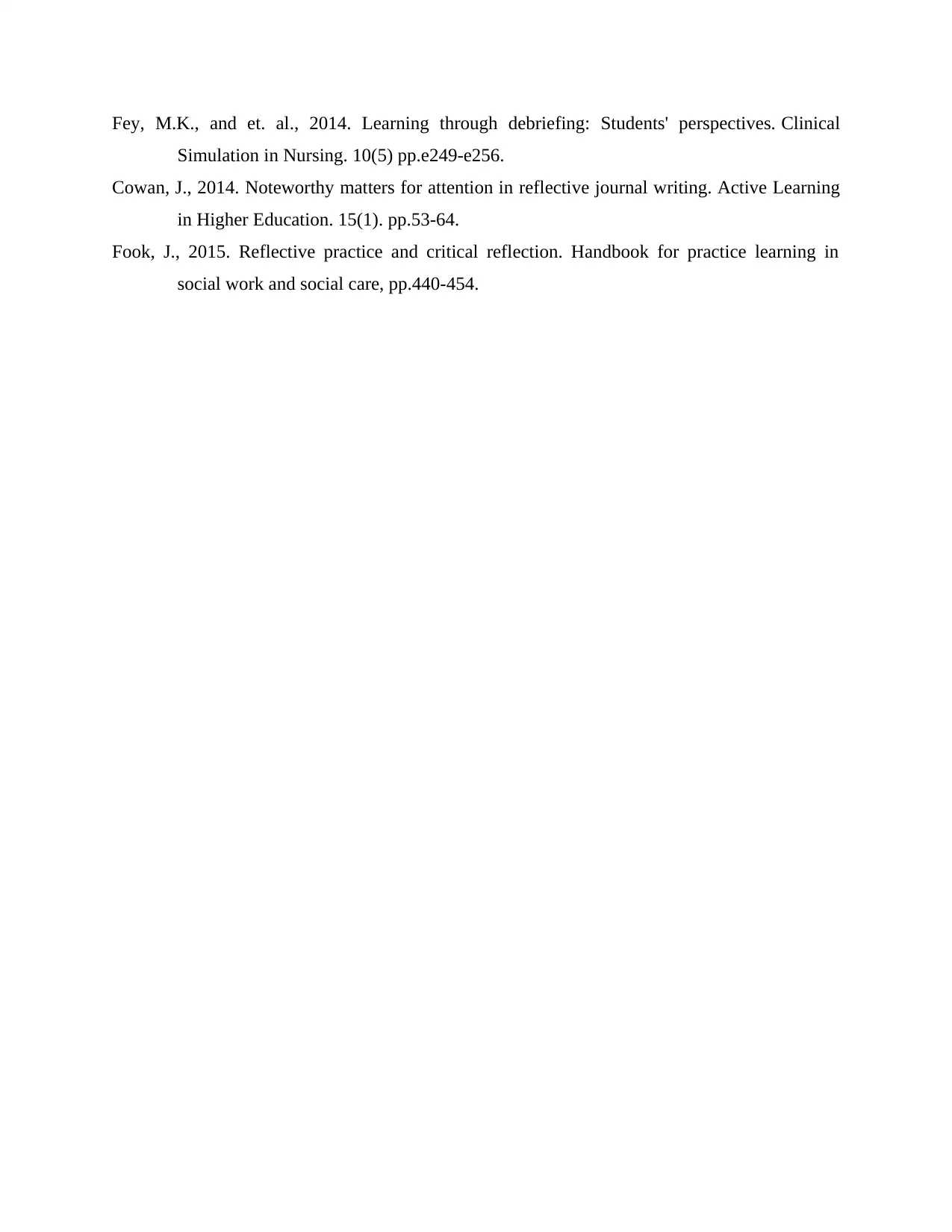
Fey, M.K., and et. al., 2014. Learning through debriefing: Students' perspectives. Clinical
Simulation in Nursing. 10(5) pp.e249-e256.
Cowan, J., 2014. Noteworthy matters for attention in reflective journal writing. Active Learning
in Higher Education. 15(1). pp.53-64.
Fook, J., 2015. Reflective practice and critical reflection. Handbook for practice learning in
social work and social care, pp.440-454.
Simulation in Nursing. 10(5) pp.e249-e256.
Cowan, J., 2014. Noteworthy matters for attention in reflective journal writing. Active Learning
in Higher Education. 15(1). pp.53-64.
Fook, J., 2015. Reflective practice and critical reflection. Handbook for practice learning in
social work and social care, pp.440-454.
⊘ This is a preview!⊘
Do you want full access?
Subscribe today to unlock all pages.

Trusted by 1+ million students worldwide
1 out of 12
Related Documents
Your All-in-One AI-Powered Toolkit for Academic Success.
+13062052269
info@desklib.com
Available 24*7 on WhatsApp / Email
![[object Object]](/_next/static/media/star-bottom.7253800d.svg)
Unlock your academic potential
Copyright © 2020–2026 A2Z Services. All Rights Reserved. Developed and managed by ZUCOL.





